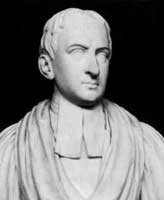A Quote by William Lane Craig
Catching the apple doesn't overturn the law of gravity or the formulation of a
new law. It's merely an intervention of a person with freewill who
overrides the natural causes operative in that particular circumstance.
And that is, essentially, is what God does when he causes a miracle to
occur.
Quote Topics
Related Quotes
Science probes; it does not prove. Imagine Newton's reaction to an objector of his law of gravity who argued that he could not establish a universal law because he had not observed every falling apple, much less proved the law of gravity - there might, after all, be an apple that levitates! Why should a group of simple, stable compounds of carbon, hydrogen, oxygen and nitrogen struggle for billions of years to organize themselves into a professor of chemistry?
The argument from design is ultimately an appeal to miraculous causes, i.e., causes that do not, and cannot, occur in the natural course of events. This is why an explanation via design is not a legitimate alternative to scientific and other naturalistic modes of explanation. To refer to a miraculous cause is to refer to something that is inherently unknowable, and this sanctuary of ignorance explains nothing at all. However much it may soothe the imagination of the ignorant, it does nothing to satisfy the understanding of a rational person.
If God causes man to be sick, sickness must be good, and its opposite, health, must be evil, for all that He makes is good and will stand forever. If the transgression of God's law produces sickness, it is right to be sick; and we cannot if we would, and should not if we could, annul the decrees of wisdom. It is the transgression of a belief of mortal mind, not of a law of matter nor of divine Mind, which causes the belief of sickness. The remedy is Truth, not matter,--the truth that disease is unreal.
In Romans 7, St. Paul says, "The law is spiritual." What does that mean? If the law were physical, then it could be satisfied by works, but since it is spiritual, no one can satisfy it unless everything he does springs from the depths of the heart. But no one can give such a heart except the Spirit of God, who makes the person be like the law, so that he actually conceives a heartfelt longing for the law and henceforward does everything, not through fear or coercion, but from a free heart.
Malebranche teaches that we see all things in God himself. This is certainly equivalent to explaining something unknown by something even more unknown. Moreover, according to him, we see not only all things in God, but God is also the sole activity therein, so that physical causes are so only apparently; they are merely occasional causes. ( Recherches de la vérité , Livre VI, seconde partie, chap. 3.) And so here we have essentially the pantheism of Spinoza who appears to have learned more from Malebranche than from Descartes.
But shall gravity be therefore called an occult cause, and thrown out of philosophy, because the cause of gravity is occult and not yet discovered? Those who affirm this, should be careful not to fall into an absurdity that may overturn the foundations of all philosophy. For causes usually proceed in a continued chain from those that are more compounded to those that are more simple; when we are arrived at the most simple cause we can go no farther ... These most simple causes will you then call occult and reject them? Then you must reject those that immediately depend on them.
We make a big mistake when we conclude that the law is the answer to bad behavior. In fact, the law alone stirs up more of such behavior. People get worse, not better, when you lay down the law. To be sure, the Spirit does use both God's law and God's gospel in our sanctification. But the law and the gospel do very different things.







































